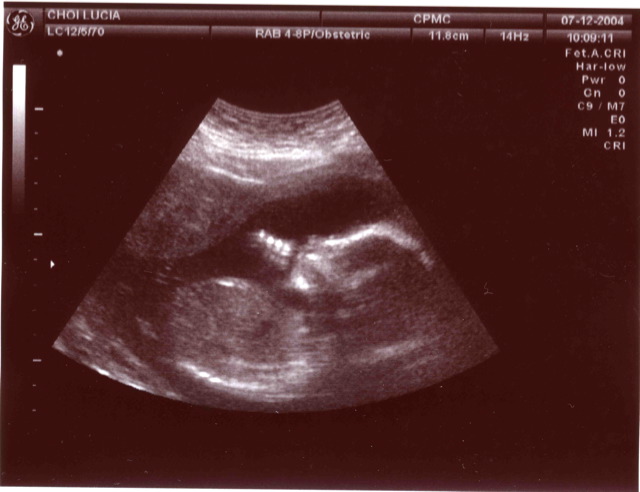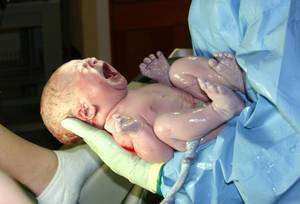Blood Tests for IVF Success
Interview with
Chris - We've now heard how you can test embryos for vital clues as to which ones are probably the healthiest and therefore likely to result in a successful pregnancy, but what about testing mothers directly so that you can predict who's got the best IVF prospects? Well Dr Cathy Allen is at the Rotunda Hospital in Dublin where she's been working on just that sort of idea. Hello Cathy, welcome to the Naked Scientists, can you first of all tell us, what are you doing about this test, what have you actually discovered?
 Cathy - Well first and foremost, I just have to clarify we're far away from having a blood test that is readily available, but as far as we have been doing is looking at possible markers in the blood, in the circulation of our personal blood that might give us some insight into what is happening and during the early conceptual time and early pregnancy. And so basically, what I was doing was looking at the messengers, the genes send out when they are undergoing a particular function or messenger RNA (mRNA), and we looked at this and again, as the same preferred blood but we looked particularly for and I think you know that would be coming not only from the mum, the maternal genome but also from developing embryo and early trophoblast or placental tissue. And we basically took a blood tests from women who were undergoing an IVF. I asked their several times points before during and after their treatment and we compared the gene expression profiles that were seen with these people.
Cathy - Well first and foremost, I just have to clarify we're far away from having a blood test that is readily available, but as far as we have been doing is looking at possible markers in the blood, in the circulation of our personal blood that might give us some insight into what is happening and during the early conceptual time and early pregnancy. And so basically, what I was doing was looking at the messengers, the genes send out when they are undergoing a particular function or messenger RNA (mRNA), and we looked at this and again, as the same preferred blood but we looked particularly for and I think you know that would be coming not only from the mum, the maternal genome but also from developing embryo and early trophoblast or placental tissue. And we basically took a blood tests from women who were undergoing an IVF. I asked their several times points before during and after their treatment and we compared the gene expression profiles that were seen with these people.
Chris - So Cathy, you're basically comparing healthy outcomes; In other words, IVF that's successful and looking at whatever spectrum of markers get turned on with less good outcomes, in order to work whether there is a combination of markers that predict a good outcome?
Cathy - Yes. Well one of the areas that we learn or one of the time points that we took was just before the potent drugs of IVF were given. So usually, in an IVF cycle, the first thing to do is to control the innate or natural hormonal cycle of the woman undergoing the treatment because you don't want her own hormonal cycle to ovulate all of the stimulated eggs that are still in the ovary at the time point when you are not ready. Everything has to be very, very controlled. So basically, the pituitary gland in the brain is suppressed and this is usually as in a lot of centres, it's about two weeks of the nasal spray before that the IVF proper begins. And at that time point, we were able to see in the bloods, in the characteristic gene profiles of the women who went on to become pregnant and those who were unsuccessful, we were able to see a very characteristic difference at that point. So, this is then something that we find very interesting and very exciting.
 Chris - Of course, but if you can see differences, then that gives you immediately something to study because you can ask, "well what is that difference and can we rectify that difference to give those people who were having a bad outcome better prospects of a successful IVF treatment in future?"
Chris - Of course, but if you can see differences, then that gives you immediately something to study because you can ask, "well what is that difference and can we rectify that difference to give those people who were having a bad outcome better prospects of a successful IVF treatment in future?"
Cathy - Well, you know the, trying to manipulate genes and gene pathways is further down the line but first is to understand, this is all very new. So, we were able to kind of look as well what are the genes and what processes in the body are being involved in and the key areas that we found at the most prominent genes that were acting differently, that they were making, you know, biologically plausible sense. So, there were key areas like new blood vessels formation and inflammation, and oxidative stress and interestingly, our group has a lot of work on cancer and stem cells, and then it was the same source of profiles that you got from the early stem cells. So obviously, there's a lot and more work to be done on this, but certainly, the two patient populations, those who went on to become pregnant, and those who didn't, were very, very different indeed. So, it will be interesting to see if this could be developed into a sort of a profile or a signature of success or failure that could help people when they are on the IVF trail and then trying to see if they're chances are good. Because at the moment, the prognostic tools that we have to guide patients, making these difficult decisions are really blunt basically. Female age and the past reproductive history and anything else and obviously, Dagan's work is very exciting. But at the moment, we still use very broad statistics to guide our patients.
 Chris - What about upstream of IVF though because obviously people have to try for a while to find out that there is a problem before they then go down that route? Some people could be spared a lot of time because obviously, people have to try for a while to prove that they're not going to get pregnant the normal way before they go and have IVF. We could spare them that time before we could pre-empt who is going to fall into that "I need IVF" category could something like the system that you're using be used to predict who those people are?
Chris - What about upstream of IVF though because obviously people have to try for a while to find out that there is a problem before they then go down that route? Some people could be spared a lot of time because obviously, people have to try for a while to prove that they're not going to get pregnant the normal way before they go and have IVF. We could spare them that time before we could pre-empt who is going to fall into that "I need IVF" category could something like the system that you're using be used to predict who those people are?
Cathy - Well, I don't see that in the earlier or in the near future. I would hope that and this information may be useful really for people who have done IVF maybe once or twice and have, you know, for no good reason or knowing explicable reason and had to have no success, and I think these are the people that I would see where it's extremely difficult for them to decide whether to, you know, throw the dice again, have another go of IVF or to call it a day. So, I think really, I think clinically, this sort of test would be probably useful for those individuals who have, you know, disappointment after disappointment.
Chris - I've got an email here from Matthew who says, "I have a question that is related to this. Is it true that a woman's degree of fertility or the amount of oestrogen that she produces depends on her genes? I'd be grateful if you could consider this."
 Cathy - Well, sort of indirectly, yes and you do need to have the proper genes, acting in a synchronized fashion for the proper hormonal and cycle to occur, but there's a lot more to it for example there are women who had have very high oestrogen levels but still reduced fertility because of the patterns of the hormones and peaking and troughing during the month would be incorrect. So yes, if you've got a very, very low oestrogen levels, it's a reflection really of what's going on with the ovaries and how they're functioning.
Cathy - Well, sort of indirectly, yes and you do need to have the proper genes, acting in a synchronized fashion for the proper hormonal and cycle to occur, but there's a lot more to it for example there are women who had have very high oestrogen levels but still reduced fertility because of the patterns of the hormones and peaking and troughing during the month would be incorrect. So yes, if you've got a very, very low oestrogen levels, it's a reflection really of what's going on with the ovaries and how they're functioning.
Chris - So, is your work suggesting then that some people are effectively genetically predestined not to get pregnant?
Cathy - Well, I don't think it's in the genome that we inherit. I think it's in the way that the genes themselves activate or are expressed. I mean basically, we all inherit our genes. We're stuck with them whatever they are, but they don't just stay static, you know during our lives. Genes are and are activated, upregulated and downregulated according to the different physiological process they're undergoing. For example, if you're recovering from an illness, certain genes will be turned on, certain genes will be turned off and really, you know, it's the expression is differently controlled in the appropriate way and who knows what affects that. May be it's our lifestyle, maybe it's in the environment, maybe it's just our physiology. But I think it's not just predestined forever, you know, from the time you we're born, no.
Chris - Which is encouraging news. Thank you, Cathy. We have to leave it though. That was Dr. Cathy Allen. She's based at the Rotunda Hospital in Dublin, where she's been working on what blood tests can tell us about the possible prospects of a course of IVF.
- Previous Improving IVF
- Next Stress During Pregnancy





Comments
Add a comment